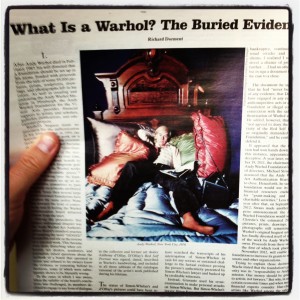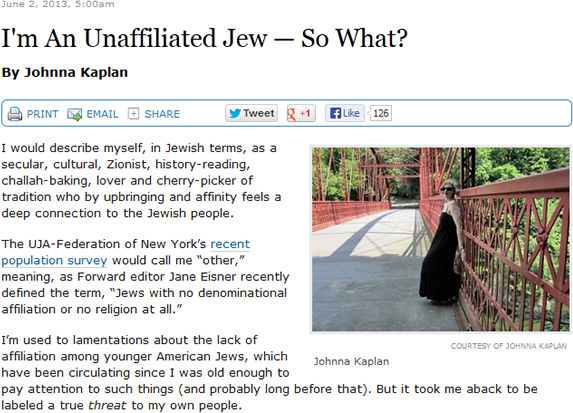 Those interested in how discourses on authenticity work to–as this article states it–stabilize an economy (of any form of signification, be it meaning or money) should consider the current issue (June 20, 2013, vol. 60/11) of The New York Review of Books and its article “What is a Andy Warhol”–an analysis of the goings on of the now defunct, but once powerful and always controversial, Andy Warhol Authentication Board.
Those interested in how discourses on authenticity work to–as this article states it–stabilize an economy (of any form of signification, be it meaning or money) should consider the current issue (June 20, 2013, vol. 60/11) of The New York Review of Books and its article “What is a Andy Warhol”–an analysis of the goings on of the now defunct, but once powerful and always controversial, Andy Warhol Authentication Board.
Biblical Literates
 That was the headline of a Huffington Post article yesterday, referring to an op-ed piece in the Des Moines Register, co-authored by three Iowa scholars of religion, all with specialties in biblical studies. The newspaper article they wrote opened by stating:
That was the headline of a Huffington Post article yesterday, referring to an op-ed piece in the Des Moines Register, co-authored by three Iowa scholars of religion, all with specialties in biblical studies. The newspaper article they wrote opened by stating:
That Ain’t The Queen’s English
One of the premises of Culture on the Edge is that an implicit, untheorized norm is still presupposed, and its legitimacy is thereby reproduced rather than being historicized, despite many scholars’ recent efforts to develop what they see to be more nuanced, historically sensitive, and situationally specific approaches to identity studies. For it is not uncommon to find seemingly anti-essentialist scholars now studying various identities in terms of their hybridity, seeing them as creoles, studying how diaspora movements have traveled and changed, and documenting the complexity of syncretism–developments understood as important improvements on what are now seen to be previous generations’ far too simplistic studies of social life. After all, as important a an early sociologist as Emile Durkheim seems merely to have understood “society” to be a homogenous, undifferentiated unit. Continue reading “That Ain’t The Queen’s English”
Cherry Pickers
On the weekend a Facebook friend posted a link to an interesting blog post on contests over modern Jewish identity. It opened as follows:
Silencing the Past
Michel-Rolph Trouillot, Silencing the Past: Power and the Production of History (Beacon Press, 1995).
A practical series of case studies (e.g., the Hatian Revolution) by the late (d. 2012) University of Chicago Professor of Anthropology/Social Sciences on how discourses on the past are not about recovering or remembering enduring items from history so much as deploying techniques in the present continually to limit what in the archives will count as the past. As such, how does one write a history of the forgotten, “a history of the impossible”–a genealogy of the choices that led to this or that narrative of “the past.”
The Yoga of Definition
 So writes Jonathan Z. Smith in his article, “Religion, Religions, Religious,” in Mark Taylor’s well-known edited book, Critical Terms for Religious Studies (1998). Because most scholars presume (mistakenly, I think) religion to exist prior to, and outside of, their studies of it, few understand their definitions to be stipulative–specifying the limits of the object in advance, e.g., “For the purposes of this study, religion is defined as…” Instead, definitions are most often assumed merely to describe, after careful observation, the limits of an already established item in the world that we, as scholars, have somehow just stumbled upon. Continue reading “The Yoga of Definition”
So writes Jonathan Z. Smith in his article, “Religion, Religions, Religious,” in Mark Taylor’s well-known edited book, Critical Terms for Religious Studies (1998). Because most scholars presume (mistakenly, I think) religion to exist prior to, and outside of, their studies of it, few understand their definitions to be stipulative–specifying the limits of the object in advance, e.g., “For the purposes of this study, religion is defined as…” Instead, definitions are most often assumed merely to describe, after careful observation, the limits of an already established item in the world that we, as scholars, have somehow just stumbled upon. Continue reading “The Yoga of Definition”


